(完整版)沪教牛津版广州英语七年级上册Unit2讲义
沪教牛津版广州英语七年级((上册))Unit2讲义全
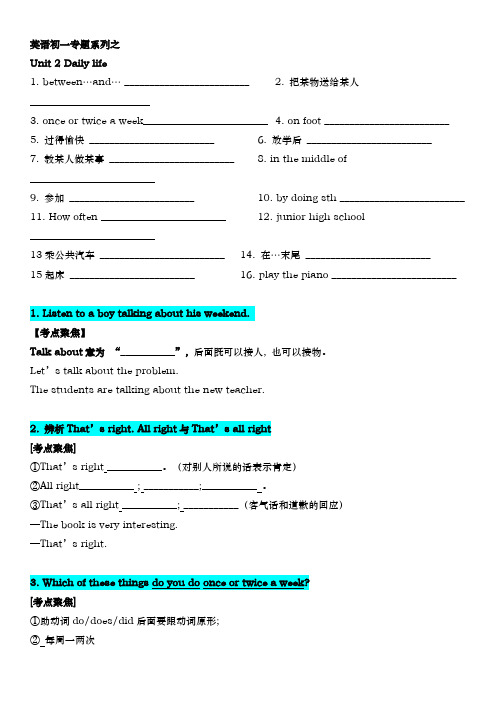
英语初一专题系列之Unit 2 Daily life1. between…and… _________________________2. 把某物送给某人________________________3. once or twice a week_________________________4. on foot _________________________5. 过得愉快_________________________6. 放学后_________________________7. 教某人做某事_________________________ 8. in the middle of_________________________9. 参加_________________________ 10. by doing sth _________________________ 11. How often _________________________ 12. junior high school_________________________13乘公共汽车_________________________ 14. 在…末尾_________________________15起床_________________________ 16. play the piano _________________________1. Listen to a boy talking about his weekend.【考点聚焦】Talk about意为“___________”,后面既可以接人, 也可以接物。
Let’s talk about the problem.The students are talking about the new teacher.2. 辨析That’s right. All right与That’s all right[考点聚焦]①That’s right ___________。
牛津上海版七年级英语上册Unit2知识点讲义
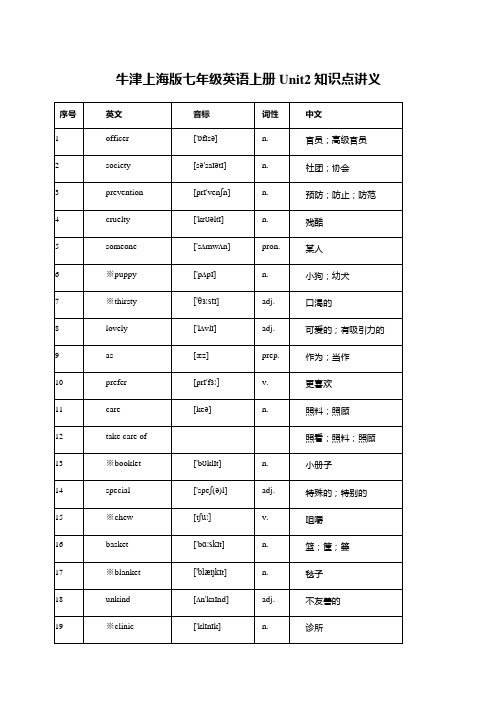
牛津上海版七年级英语上册Unit2知识点讲义知识点梳理I. Useful words and expressions1. I’m an SPCA officer.➢注意:SPCA中的“S”/es/的发音以元音开头,所以要用冠词an. 类似的字母发音以元音开头还有:F、H、L、M、N、S、X。
2. That’s right.➢注意区别:That’s right, That’s all right, All rightAll right=OK 好的;好吧That's all right意为“没关系,不客气”,用于Sorry或Thank you的回答。
That's right意为“那没错”, 表示某人的观点正确。
3. They had no food or water.➢no=not any 本句可改写为:They didn’t have any food or water.➢肯定句中连词应用and[e.g.] The students sang and danced in the park yesterday.否定句中连接并列成分应用or[e.g.]There isn’t any air or water on the moon.4. I found them and took them to the SPCA.➢take sb. / sth. to some place 把……带去(某地)bring sb. / sth. to some place 把……带来(某地)5. Would you like to keep one as your pet?➢Keep…as…:饲养…当作➢one(s) 用来代替前面出现过的单数(复数)的人或物;[e.g.] I’m looking for a cat. Do you see one?The books on this desk are newer than the ones on that desk.6. I prefer the black one.➢prefer最常见的意思是"比较喜欢"、"更喜欢"等, 可以构成以下结构:1) prefer sth/doing sth.. [e.g.] I prefer watching TV.2) prefer to do sth. [ e.g.] I prefer to go at once.3) prefer sth. /doing sth. to sth. / doing sth. = like…better than…[e.g.] I prefer coffee to tea.Mr. Wang preferred reading to doing nothing.7. How to take care of your new puppy?➢take care of + n. /pron.(代词用宾格)➢take care of = look after =care for➢好好照顾,悉心照顾take good care of = look after well8. Feed him/her 1-2 times every day.➢every day 时间副词; 每天[e.g.] I leave home for school at 7 o’clock every day.everyday = daily形容词;每天的,日常的。
上海牛津版英语七年级上册七上7AUnit2U2同步讲义教案

学员编号:年级:课时数:学员姓名:辅导科目:英语学科教师:授课类型T Unit2(牛津7上)同步梳理教学目标1、使学生能够基本掌握牛津7年级上册Unit1中的基础词汇及重要句型;星级★★★授课日期及时段T同步-U2基础知识梳理(建议时间:5分钟)你喜欢什么动物?在放学回家的马路上看到流浪的、被人遗弃的小动物时你是怎么做的呢?一、词汇Words (建议20分钟,老师边讲边要求学员记住单词,此环节结束之后要求学员记住80%)1. officer n. 官员;高级官员【词性转换】office n. 办公室e.g. A police officer came to help when our car broke down on the way.我们的汽车在路上出了毛病,一位警官帮了我们的忙。
2. society n. 社团;协会【词性转换】social adj. 协会的;社会的e.g. the Chemical Society of China 中国化学学会3. prevention n. 预防;防止;防范【词性转换】prevent v. 预防;防止e.g. Prevention is better than cure. 预防胜于治疗。
批注:prevent和protect,很多孩子分辨不清楚,还应该让孩子注意protect的名词形式是protection。
4. cruelty n.残酷【词性转换】cruel adj. 残酷的;悲惨的e.g. cruelty to children 虐待儿童5.someone pron. 某人【近义词】somebody pron. 某人;有人e.g. Someone wants to talk with you. 有人想和你谈话。
6. puppy n. 小狗;幼犬【提示】dog一般用来指“成年狗”或表示狗的总称;puppy特指小狗,复数形式为puppies7. thirsty adj. 口渴的【词性转换】thirst n. 口渴e.g. I often feel thirsty when it’s very hot. 天热时,我常感到口渴。
沪教牛津版本初中七年级的上册的讲义.docx
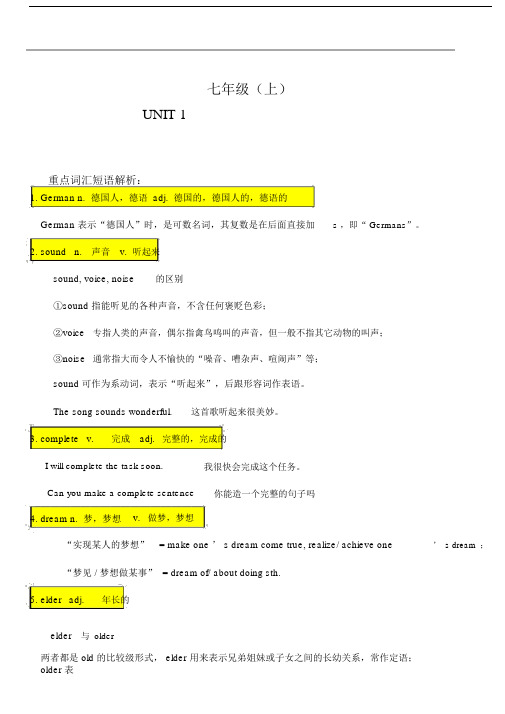
七年级(上)UNIT 1重点词汇短语解析:1.German n. 德国人,德语 adj. 德国的,德国人的,德语的German 表示“德国人”时,是可数名词,其复数是在后面直接加s ,即“ Germans”。
2. sound n.声音v.听起来sound, voice, noise的区别①sound 指能听见的各种声音,不含任何褒贬色彩;②voice专指人类的声音,偶尔指禽鸟鸣叫的声音,但一般不指其它动物的叫声;③noise通常指大而令人不愉快的“噪音、嘈杂声、喧闹声”等;sound 可作为系动词,表示“听起来”,后跟形容词作表语。
The song sounds wonderful.这首歌听起来很美妙。
3. complete v.完成adj.完整的,完成的I will complete the task soon.我很快会完成这个任务。
Can you make a complete sentence你能造一个完整的句子吗4. dream n. 梦,梦想v.做梦,梦想“实现某人的梦想”= make one ’ s dream come true, realize/ achieve one’ s dream;“梦见 / 梦想做某事”= dream of/ about doing sth.5. elder adj.年长的elder与older两者都是 old 的比较级形式, elder 用来表示兄弟姐妹或子女之间的长幼关系,常作定语;older 表1示新旧程度、年大小关系,可作表也可作定。
My elder sister is older than me.我的姐姐比我大。
6. friendly adj.友好的,友的以 -ly尾的并不一定是副,常以-ly 尾的形容: lovely, lively, lonely, daily, ,7.pron. 你自yourself己反身代:myself yourself himself herself itself ourselves yourselves themselves 我自己你自己他自己她自己它自己我自己你自己他自己常反身代构成的短:enjoy oneself = have a good time玩得开心help oneself to,, 随便,,by oneself独自地,独地8. livewith和⋯⋯住在一起Who do you live with你和住一起9. close to(在空、上)接近、靠近My house is close to the park.我的房子离公园很近。
沪教牛津版广州英语七年级上册Unit2讲义(精品资料).doc

【最新整理,下载后即可编辑】英语初一专题系列之Unit 2 Daily life1. between…and… _________________________2. 把某物送给某人________________________3. once or twice a week_________________________4. on foot_________________________5. 过得愉快_________________________6. 放学后_________________________7. 教某人做某事_________________________ 8. in the middle of _________________________9. 参加_________________________ 10. by doing sth_________________________11. How often _________________________ 12. junior high school _________________________13乘公共汽车_________________________ 14. 在…末尾_________________________15起床_________________________ 16. play the piano_________________________1. Listen to a boy talking about his weekend.【考点聚焦】Talk about意为“___________”,后面既可以接人, 也可以接物。
Let’s talk about the problem.The students are talking about the new teacher.2. 辨析That’s right. All right与That’s all right[考点聚焦]①That’s right ___________。
沪教牛津版(2024)七年级英语上册+习题课件+Unit+5+Section2+Grammar+课件

A. Are; will borrow
B. Is; going to borrow
C. Will; borrows
D. Are; going to borrows
2.It will _____ very cold tomorrow.
A. be
B. is
C. going to be
D. are
3.I_____ shopping with my mum next weekend.
随堂练习:单项选择 1.Tom ________ at 10pm.
A. are going to arrive B. will be arrive C. is going to 2.Tina ________ for Shanghai in three days.
A.left B. is left C. is leaving D. leaves 3.—Hellen, where are you?
1.时间类标志词: tomorrow(明天)、the day after tomorrow(后天)、 next week(下周)、next year(明年)
具体时间段:in two weeks(两周后)、in five years(五年后) 未来某个时间段:in the future(在将来)、
some day(将来的某一天)
如:I’m leaving for Shanghai the day after tomorrow. 我后天去上海。
Helen, where are you going? 海伦,你去哪?
一般将来时
(2) 表示交通方式、行程安排的动词,如walk, fly, drive, ride, take (a taxi, a bus)等,现在进行时也表将来。 如:I’m driving to the library in the afternoon. 我下午要开车去图书馆 We are flying to London tomorrow. 我们明天要飞去伦敦。
牛津新沪教版初中英语七年级上册unit2Grammar精品课件(共18张PPT)

Counting times
Mon Tues Wedபைடு நூலகம்Thu Fri
Sam Mary
Jane Lily Kitty John
on foot on foot
on foot on foot on foot bus
on foot on foot
on foot on foot bus bus
on foot on foot
Pronunciation rules
• 清辅音后读/s/ • 浊辅音和元音后读/z/
likes works helps
studies gives
•/s/,/z/,/S/,/t/, washes watches /J/后读/Iz/
A1 Complete the conversation .
S1: (1) Does Sam go to school by bus? S2: No, he (2)____. He (3)___ doesn’t goes(go) to school on foot. play (play) S1: (4) Do ___ Sam and his friends _____ games during the morning break? do S2: Yes, they (5)___________. S1: What (6)_____ does Sam ____ do (do) after school? S2: He (7)____ takes (take) part in the school band practice.
Exercise
Change the following verbs into their third-person singular forms. listen listens talk talks
牛津沪教版英语七年级上Unit 2辅导讲义

七年级上U2Can 的用法:1,表示能力(如体力和脑力方面),意为“能;会”等。
例如:Can you speak English? 你会讲英语吗?Can you play the piano? 你会弹钢琴吗?2. 表示请求或允许,多用在口语中,意为“可以;能”等。
用于疑问句中用来提出要求,用于否定句表示不允许。
例如:Can I help you? 我能帮助你吗?You can’t play basketball. 你不能玩篮球。
3. 表示可能。
Errors Presentation1,An Englishman who ____not speak Italian was once traveling in Italy.A) must B) could C) may D) might2,He ____the 9:20 train because he didn't leave home till 9:25.A) can reach B) could catch C) may not catch D) couldn't have caught3.Mr Wang ______ be in Nanjing now, he went to Beijing only this morning.A. mustn’tB. may notC. can’tD. needn’t4. –Who is the man over there? Is it Mr Li?--No, it ______ be him. Mr Li is much taller.A. musn’tB. may notC. can’tD. needn’t5. A computer ______ think for itself, it must be told what to do.A. can’tB. couldn’tC. may notD. might notContent of courses重点单词:1.officer [ˈɒfɪsə(r)] n. 军官,警官; 高级职员; v. 指挥; 统率;变形过去分词: officered 复数: officersEg.He served during peace-time as an intelligence officer in the Navy.他在和平时期担任海军情报官员。
牛津沪教版英语七年级上Unit 2 Lesson 1辅导讲义(答案不全)
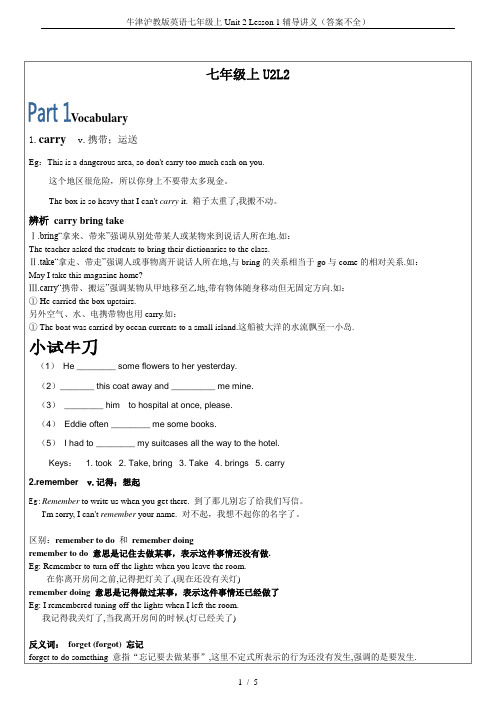
七年级上U2L2Vocabulary1.carry v.携带;运送Eg:This is a dangerous area, so don't carry too much cash on you.这个地区很危险,所以你身上不要带太多现金。
The box is so heavy that I can't carry it. 箱子太重了,我搬不动。
辨析carry bring takeⅠ.bring“拿来、带来”强调从别处带某人或某物来到说话人所在地.如:The teacher asked the students to bring their dictionaries to the class.Ⅱ.take“拿走、带走”强调人或事物离开说话人所在地,与bring的关系相当于go与come的相对关系.如:May I take this magazine home?Ⅲ.carry“携带、搬运”强调某物从甲地移至乙地,带有物体随身移动但无固定方向.如:① He carried the box upstairs.另外空气、水、电携带物也用carry.如:① The boat was carried by ocean currents to a small island.这船被大洋的水流飘至一小岛.(1)He ________ some flowers to her yesterday.(2)_______ this coat away and _________ me mine.(3)________ him to hospital at once, please.(4)Eddie often ________ me some books.(5)I had to ________ my suitcases all the way to the hotel.Keys: 1. took 2. Take, bring 3. Take 4. brings 5. carry2.remember v.记得;想起Eg:Remember to write us when you get there. 到了那儿别忘了给我们写信。
牛津沪教版英语七年级上Unit 2 Lesson 3讲义(无答案)
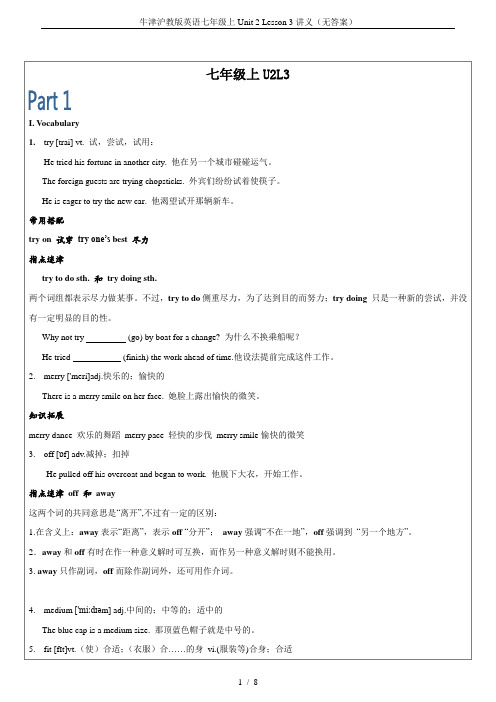
七年级上U2L3I. Vocabulary1.try[trai]vt. 试,尝试,试用:He tried his fortune in another city. 他在另一个城市碰碰运气。
The foreign guests are trying chopsticks. 外宾们纷纷试着使筷子。
He is eager to try the new car. 他渴望试开那辆新车。
常用搭配try on 试穿try one’s best 尽力指点迷津try to do sth. 和try doing sth.两个词组都表示尽力做某事。
不过,try to do侧重尽力,为了达到目的而努力;try doing 只是一种新的尝试,并没有一定明显的目的性。
Why not try (go) by boat for a change? 为什么不换乘船呢?He tried (finish) the work ahead of time.他设法提前完成这件工作。
2.merry['meri]adj.快乐的;愉快的There is a merry smile on her face. 她脸上露出愉快的微笑。
知识拓展merry dance 欢乐的舞蹈merry pace 轻快的步伐merry smile愉快的微笑3.off [ɒf] adv.减掉;扣掉He pulled off his overcoat and began to work. 他脱下大衣,开始工作。
指点迷津off 和away这两个词的共同意思是“离开”,不过有一定的区别:1.在含义上:away表示“距离”,表示off“分开”;away强调“不在一地”,off强调到“另一个地方”。
2.away和off有时在作一种意义解时可互换,而作另一种意义解时则不能换用。
3. away只作副词,off而除作副词外,还可用作介词。
4.medium ['miːdɪəm] adj.中间的;中等的;适中的The blue cap is a medium size. 那顶蓝色帽子就是中号的。
Speaking, U2广州牛津英语七年级上Unit2课件

[s]
[s] [z] [iz]
[s]
[iz] [s] [z]
3 Dear Santa, can you send me seven boxes of oranges?
[s]
4 The zoo closes at seven, so Sally cannot see the animals.
[ziz] [s]
[s]
• In pairs, take turns to ask and answer questions and complete your classmate’s daily schedule below. do morning exercises go to bed have lunch go home have classes
Remember to use when, what, how and usually to ask your classmate about his/her daily life.
__________’s daily life Time Activity _____ a.m. gets up go to bed _________ washes face, brushes teeth _________ has breakfast (e.g. a piece of bread, a glass of milk, an egg, _________ _________ goes to school (on foot or by ____s][z] [s] [z][s] [z] [s] [z]
[s]
1 Susan sings songs in her seat.
[s] [z]
2 Sam loves books about seasons and flowers.
牛津沪教版英语七年级上Unit 2 Lesson1讲义(无答案)
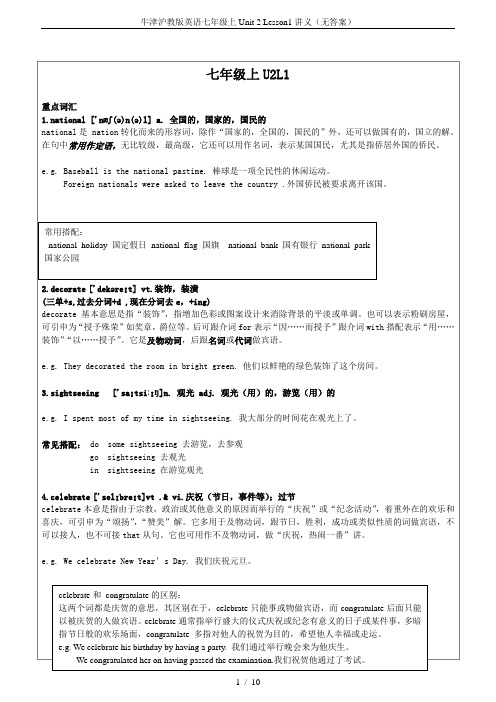
七年级上U2L1重点词汇1.national ['næʃ(ə)n(ə)l] a. 全国的,国家的,国民的national是 nation转化而来的形容词,除作“国家的,全国的,国民的”外,还可以做国有的,国立的解。
在句中常用作定语,无比较级,最高级,它还可以用作名词,表示某国国民,尤其是指侨居外国的侨民。
e.g. Baseball is the national pastime. 棒球是一项全民性的休闲运动。
Foreign nationals were asked to leave the country .外国侨民被要求离开该国。
常用搭配:national holiday 国定假日national flag 国旗national bank 国有银行national park国家公园2.decorate['dekəreɪt] vt.装饰,装潢(三单+s,过去分词+d ,现在分词去e,+ing)decorate基本意思是指“装饰”,指增加色彩或图案设计来消除背景的平淡或单调。
也可以表示粉刷房屋,可引申为“授予殊荣”如奖章,爵位等。
后可跟介词for表示“因……而授予”跟介词with搭配表示“用……装饰”“以……授予”。
它是及物动词,后跟名词或代词做宾语。
e.g. They decorated the room in bright green. 他们以鲜艳的绿色装饰了这个房间。
3.sightseeing['saɪtsiːɪŋ]n. 观光 adj. 观光(用)的,游览(用)的e.g. I spent most of my time in sightseeing. 我大部分的时间花在观光上了。
常见搭配: do some sightseeing 去游览,去参观go sightseeing 去观光in sightseeing 在游览观光4.celebrate['selɪbreɪt]vt .& vi.庆祝(节日,事件等);过节celebrate本意是指由于宗教,政治或其他意义的原因而举行的“庆祝”或“纪念活动”,着重外在的欢乐和喜庆,可引申为“颂扬”,“赞美”解。
2019沪教牛津版七年级上册Unit2讲义(无)语文

英语初一专题系列之Unit 2 Daily life课前检测⋯ and⋯ 2.把某物送给某人3.once or twice a week4.on foot5.过得快乐6.放学后7.教某人做某事 8.in the middle of9.参加 10.by doing sth11.How often 12.junior high school13 乘公共汽车14.在⋯尾端15 起床 16.play the pinao1.Listen to a boy talking about his weekend.【考点聚焦】Talk about 意为“〞,后边既可以接人,也可以接物。
Let’s talk about the problem.The students are talking about the new teacher.[易混辨析]talk of 提及,谈起多指谈起某事Talk to/with 与⋯⋯发言后边平常跟人做宾语,但 talkwith 更重视双方的发言Talk of the devil and he comes.Our teacher is talking to/with our monitor.2.辨析That’s right .All right 与That’s all right[考点聚焦]①That’s right 。
〔对别人所说的话表示必然〕②All right ;;。
③That’s all right ;〔客气话和对不起的回应〕— The book is very interesting.— That’s right.3.Which of these things do you do once or twice a week?第 1 页[考点聚焦]①助动词do/does/did后边要跟动词原形 ;②每周一两次注意:在英语中,表示一次用“once,〞两次用“twice,〞表示三次也许三次以上就用“基数词+times〔〞time在这里是可数名词,表示次数,需要加“s〕〞如: once a week, twice a week, three〔four/ five 〕⋯ times a weekI play computer games once or twice a week.She 〔watch〕TV 〔一周两次〕1.— Would you please help me do the dishes,John〔? 2021 吉林长春中考〕—,but I’m busy cleaning my room.’re welcome ’m sorryC.It doesn’t matter ’s right2.— The programme is very popular.— .We all like it.’s right B.Not at allC.It doesn’t matter ’re welcome’s discuss the problem after school.A.talk to C.talk aboutC.know aboutD.think about4.他一周上一两次网。
- 1、下载文档前请自行甄别文档内容的完整性,平台不提供额外的编辑、内容补充、找答案等附加服务。
- 2、"仅部分预览"的文档,不可在线预览部分如存在完整性等问题,可反馈申请退款(可完整预览的文档不适用该条件!)。
- 3、如文档侵犯您的权益,请联系客服反馈,我们会尽快为您处理(人工客服工作时间:9:00-18:30)。
后+时间)指上午、下午或晚上;年月或
+地点)大地方用”in” In the morning; In January ;in spring ;Arrive in Beijing
, 在星期几前, 在节日前, 某天
On May 21st;on Monday. On New Year’s Day. On the morning of May 2nd. 一言辨异:Look! The boy is watching the football game, his father is seeing a film, and his mother is reading a newspaper.
A. What an B. What C. How an D. How
— ___________exciting boat race it was! Many people watched it. (2016云南)
A. What a B. What an C. How D. How a
回答:once a week;three times a month
回答:in an hour;in two weeks
回答:three days;four weeks
回答:ten miles, three minutes’ walk
—How often do you exercise?
My father ______________________every day.
—Could you tell me it takes to walk to the Disneyland?(2016陕西中考)
—About 20 minutes.
A. how far B. how long C. how often D. how soon
考点聚焦]频度副词
never是频度副词, 意为”___________ “, 一般用来加强否定语气, 通常用于be 动词、助动
, 实义动词之前。除never外, 其他常见的频度副词还有always, usually, often
等。
’ll never do it again.
易混辨析]
他一周上一两次网。
He surfs the Internet _________________________________a week.
(对划线部分提问)
do you go swimming?
考点聚焦]
how often 多久一次, 询问动作发生的频率(上节学过的特殊疑问句, 现在再来复习)
’s talk about the problem.
Байду номын сангаас
辨析That’s right. All right与That’s all right
考点聚焦]
That’s right ___________。(对别人所说的话表示肯定)
All right___________ ; ___________;___________ 。
看”, 强调动作的结果, 但不一定是有意识地看 See a movie /doctor
Read newspaper 看报纸
在这里表示时间, “在” 如: at half past two 在两点半
后+时间)在具体的钟点(后+地点)小
”at” at 8 am; Arrive at school
A. Look;look B. See;look C. Look;see D. See;look at
同义句改写
Do you enjoy yourselves at the party?
Do you ______________________at the party?
Do you ______________________at the party?
— ___________, but I’m busy cleaning my room.
A. You’re welcome B. I’m sorry C. It doesn’t matter D. That’s right
—The programme is very popular.
—We learned the differences fact and opinion.
A. between B. among C. during D. beyond
___________(exercise)every day.
___________(exercise)three times a week.
乘公共汽车 _________________________ 14. 在…末尾 _________________________
起床 _________________________ 16. play the piano _________________________
意为 “___________”, 后面既可以接人, 也可以接物。
Different:不同的。反义词:___________
Be different from “ “
enjoy doing sth= like/love doing sth___________
enjoy oneself
___________和___________
___________:获悉;了解
2. 把某物送给某人 ________________________
4. on foot _________________________
过得愉快 _________________________ 6. 放学后 _________________________
教某人做某事 _________________________ 8. in the middle of _________________________
—Great! ___________
A. Thank you B. Have a good time! C. Best wishes! D. Glad to see you again
A. between B. among C. over D. above
—Hi, guys. Where were we yesterday?
join in
”球赛、游戏”等, 常用于日常口语
attend
, 指参加会议、婚礼、典礼;听报告、讲座等。
do morning exercis
考点聚焦]
意为_________________________________ , 一般用语, 可指训练, 锻炼, 操练等
可数名词用, “练习, 习题, 体操, 功课, 操练”等, 常用复数。
the singing competition because there was something wrong with his throat.
A. join B. attend C. take part in D. participate
—I’ll go to Japan for a trip next month.
参加 _________________________ 10. by doing sth _________________________
_________________________ 12. junior high school _________________________
That’s all right ___________; ___________(客气话和道歉的回应)
The book is very interesting.
That’s right.
考点聚焦]
do/does/did后面要跟动词原形;
每周一两次
在英语中, 表示一次用once, 两次用twice, 表示三次或者三次以上就用基数词+times(time在
___________(一周四次)
watch television= watch TV 看电视
辨析]watch、look、see、read
观看、注视”, 全神贯注地看
Watch TV/game/match
看、望”, 指动作的过程, 表示有意识地看, 但不强调看
, 后加介词”at” Look at 看 look for寻找 Look after 照顾
如:give sb. a ring A magic ring
这是一个由how引起的感叹句
用来表达喜、怒、哀、乐等强烈情感的句子是感叹句, 句末用感叹号, 一般用感叹词how或
引导
:(1)how+形容词/副词+主语+谓语(有时也可以省掉主谓语)
这个公园多漂亮啊! ______________________
频度副词, 多用于一般现在时的句子中
表示不明确的或尚未确定的时间, 既可以表示过去的时间也可以表
名词短语, 此时的time是不可数名词, 意为”时间”
(2)What+a/an +形容词+单数可数名词+主语+谓语!
What a kind man he is!
是多么诚实的一位男孩啊!______________________
(3)What+形容词+不可数名词/复数名词+主语+谓语!
!
What beautiful flowers these are!
他们是多么聪明的学生啊!______________________
